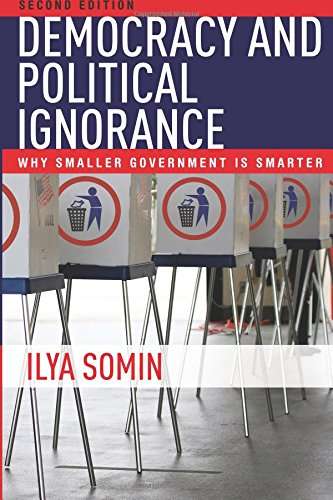The Volokh Conspiracy
Mostly law professors | Sometimes contrarian | Often libertarian | Always independent
Introduction to my book "Democracy and Political Ignorance: Why Smaller Government is Smarter" Now Available on SSRN
The Introduction to the revised second edition summarizes the rest of the book, and is available for free.

The Introduction to the revised second edition of my book Democracy and Political Ignorance: Why Smaller Government Is Smarter (Stanford University Press) is now available for download on SSRN. The Introduction provides an overview of the book's thesis and summarizes the issues covered in each chapter. Here is the abstract:
One of the biggest problems with modern democracy is that most of the public is usually ignorant about politics and government. Many people understand that their votes are unlikely to change the outcome of an election and don't see the point in learning much about politics. This creates a nation of people with little political knowledge and little ability to objectively evaluate what they do know.
Democracy and Political Ignorance mines the depths of public ignorance in America and reveals it as a major challenge for democracy. It weighs various potential solutions, concluding that political ignorance is best mitigated and its effects lessened by decentralizing and limiting government. People make better decisions when they choose what to purchase in the market or which state or local government to live under, than when they vote at the ballot box, because they have stronger incentives to acquire relevant information and to use it wisely.
The second edition of Democracy and Political Ignorance fully updates its analysis to include new discussions of the "Big Sort" and its implications for "voting with your feet," the connection between political ignorance and the disproportionate political influence of the wealthy, new proposals for increasing political knowledge, and up-to-date survey data on political ignorance from recent elections.
The Introduction outlines the core argument of the book, and provides summaries of the chapters that follow.
In this post, I summarized what is new in the second edition, as compared to the first edition, published in 2013. For those who may be interested, the original edition has been translated into Italian and Japanese.
Editor's Note: We invite comments and request that they be civil and on-topic. We do not moderate or assume any responsibility for comments, which are owned by the readers who post them. Comments do not represent the views of Reason.com or Reason Foundation. We reserve the right to delete any comment for any reason at any time. Comments may only be edited within 5 minutes of posting. Report abuses.
Please to post comments


Two of the three Somin obsessions now have 2019 posts. Only need political ignorance now.
If there is anything a current right-winger can't abide, it's a libertarian.
Mostly true. They dusted off their Gadsden flags after the midterm elections and are ready for anything the House does.
When is your book coming out on your obsession with Somin's obsessions? I can't recall a Somin post where you didn't comment about it.
"One of the biggest problems with modern democracy is that most of the public is usually ignorant about politics and government."
Let see, there's over 7 million people working directly for local, state, and federal govts (and who know how many retirees).
There's got to be millions involved with PACs and special interests (e.g. NRA, Sierra Club, etc).
How many teachers for poly-sci, govt relations, etc. at HS and higher levels?
Media?
Lawyers?
Business compliance folks (e.g. auditors, regulators, etc)?
Seems to me there are more people out there who have some awareness and knowledge of govt activities than Prof. Somin cares to admit.
"Let see, there's over 7 million people working directly for local, state, and federal govts (and who know how many retirees)."
Why would this make them knowledgeable about politics and government? If you clean the toilets at a law firm, are you knowledgeable in the law?
A book describing a large state apparatus as "political ignorance" could have limited appeal, one might think. After all, political ignorance was pretty high in the Soviet Union and remains pretty high in the EU and say China. Also, a healthy fraction of the people who "know" about government in such cases tend to be rent-seekers. Present company excepted, of course.
And once again Prof. Somin campaigns for a meritocracy, where he gets to pick those with sufficient merit.